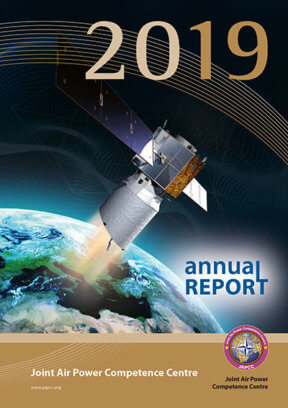Foreword
Today, NATO Air Forces stand on the verge of the most meaningful transformation of technology and capability in our history, a transformation which continues to be enabled in part by the independent thought and analysis from the recognized air and space power experts in the Joint Air Power Competence Centre. This edition of the Annual Report summarizes what was a busy 2019 and provides a glimpse into the work JAPCC will be engaged in across the Air and Space domains for 2020.
The shifting strategic environment and emerging technologies are bringing new threats and challenges. Hypersonic missiles, autonomous weapons and offensive cyber capabilities are just a few of the systems being developed specifically for military use that we must be prepared not only to employ but to counter.
Our Air Forces have demonstrated operational excellence in recent operations, but we cannot become complacent. Fifth-generation aircraft are now operating throughout European airspace and participating in a wide range of NATO operations and exercises. These new platforms represent a gamechanging leap in capability and complement our current force structure. The next step is for these aircraft to maximize interoperability fighting alongside existing platforms, developing and refining tactics, techniques, and procedures to enable improved performance of legacy systems. Maximizing the force-multiplying capabilities of fifth-generation platforms is a vital element of how we counter the rapid advancement of potential adversaries’ offensive and defensive weapons. We continue to focus on this integration with JAPCC Subject Matter Experts.
The JAPCC Opposition Forces (OPFOR) Air Team continued to provide extensive support to the Joint Warfare Centre in Stavanger in the preparation and conduct of Exercise Trident Jupiter. In November, the team was able to present a number of Joint All Domain challenges to the Training Audience at both the operational and strategic levels, testing our Alliance at the peertopeer level. We must use the lessons learned from this and other exercises to evolve our Alliance into a connected, Joint All Domain fighting force that is agile and capable of acting at a speed that future conflicts will require. I have great confidence that our Nations and our people will work closely with industry to innovate and create solutions to the challenges we face.
Furthermore, in December 2019, NATO Defence Ministers took important decisions for NATO’s continuing adaptation process, including an agreement to recognize Space as a new operational domain for NATO, alongside Air, Land, Sea and Cyberspace. The JAPCC Space Team is actively working with AIRCOM to further military thought in this area while assessing the expanded implications of this declaration on NATO planning and strategy. These efforts will continue to grow the Space expertise the JAPCC has provided for NATO since the CoE was established in 2005.
In closing, I would like to thank our Sponsoring Nations for continuing to support the JAPCC and seize this opportunity to encourage other Nations not currently participating in the JAPCC to look at taking on an active role as a Sponsor or Contributing Nation. Presence in the JAPCC provides access to a unique network of experts in the Air and Space domains and allows members to contribute to work that influences decisionmaking at the highest levels in our Alliance. With that in mind, I commend to you this 2019 JAPCC Annual Report. I trust you will find it relevant to your nation or organization.
Good Reading!
Jeffrey L. Harrigian
General, USA AF
Director, JAPCC









